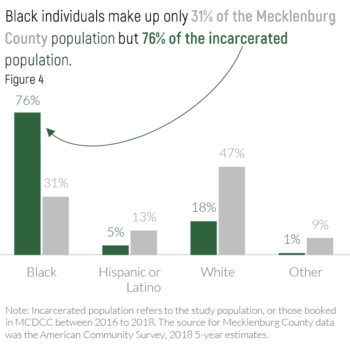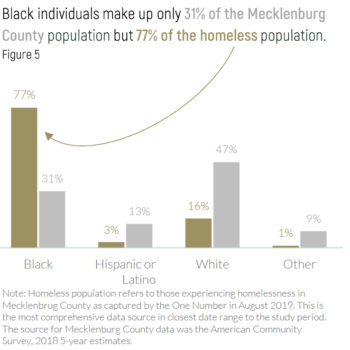Three Takeaways From New Report on Homelessness and Incarceration in Charlotte-Mecklenburg
Bridget Anderson
Research Associate
UNC Charlotte Urban Institute
Today, May 4th, Mecklenburg County Community Support Services released the Homelessness Among the Incarcerated Population Integrated Data Report, authored by the Charlotte Urban Institute. This report examines the rate of and risk factors for homelessness among those experiencing incarceration in Mecklenburg County detention centers.
This report is part of the Housing Instability & Homelessness Integrated Data Report Series. This year’s Integrated Data Report looks different from prior years. The report is shorter and focused on the findings, but links readers to a methodology brief where they can learn more about how the study was conducted. This new format is intended to make the findings and implications of the study more accessible to the public.
This blog post outlines the key findings from the report and what it means for Charlotte-Mecklenburg.
Who was in the study?
This study examined a population of 18,878 people 18 years or older who were incarcerated in a Mecklenburg County Sheriff’s Office detention center at least once between 2016 and 2018.
Key findings
- Nearly 7% of persons in this study experienced homelessness in the two years before or after incarceration.
- Incarcerated people with a prior history of homelessness were 22 times more likely to have another homeless episode after their release, compared to those without prior history of homelessness. People who identified as Black, female, and who were older were also more likely to experience homelessness after release.
- Black individuals are overrepresented in Charlotte-Mecklenburg detention centers and homeless services. During the study period, Black individuals made up only 31% of the Mecklenburg County population but more than 75% of the County’s incarcerated and homeless populations.
What does this mean for Charlotte-Mecklenburg?
This report supports Charlotte-Mecklenburg’s A Home for All Strategic Framework through its cross-sector and intentional use of data to reveal populations in most need of support with housing. More specifically, this report equips policy makers, service providers, and advocates with data to enumerate the need for housing and risk factors for homelessness among recently incarcerated individuals.
Stakeholders can use the data in this report, along with the report recommendations, to inform public policy and conversation around access to affordable housing and services for people with criminal histories.




